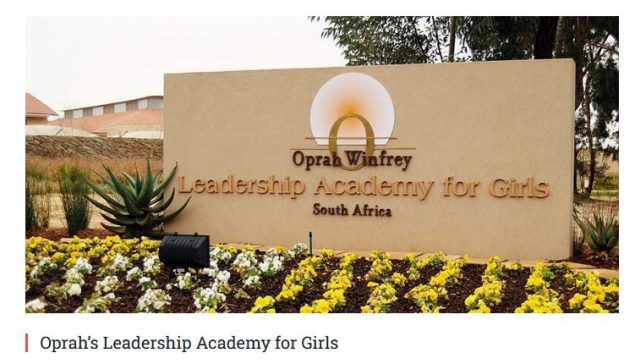I had a house in Africa, to paraphrase Karen von Blixen, author of the autobiographical “Out of Africa.” My first home was in a small town named Henley-on-Klip, in South Africa, where Oprah Winfrey chose to build a Leadership Academy for Girls.
When I saw Oprah turning that fertile, red soil to plant a tree on the 50-acre school grounds, I thought of my plot, just around the corner. Because of drought restrictions, I watered the half acre of acacia, golden cypress, jacaranda, willow and fruit trees we had planted with buckets. My two-year-old would toddle beside me, a miniature watering can in her tiny hand.
But that was a long time ago. From my vantage point in the US, I now looked on with pride at Oprah’s endeavor. How different it was from, say, Angelina Jolie’s. Jolie now regularly slams the West for not doing enough for the world’s poor. Jolie, who carts about a color-coordinated brood of illegitimate kids, has some nerve, of course. The West has given trillions in aid to the Third World! But with that pretentious tart, it’s all about emphasizing her providential purpose in the universe. To that end, she likes to discredit the rest.
There was none of that with Oprah. Her politics may be populist; but her deeds are patrician. Dare I suggest that there was something both Randian and Jeffersonian about this particular project?
As to the Randian grandness: The petty-minded at home and abroad carped about Oprah’s opulence. They wanted to know why she needed “this kind of environment for African girls, who were coming from huts.” Indeed, the project cost over $40 million and was intended, in Oprah’s words, to create “a beautiful environment that would inspire [the students].” She fussed over the architecture, she installed an amphitheater, fabulous library with fireplace, modern marble kitchen, an audio-video center, gym, tennis courts, and spa—the scale and the splendor scream “made in America.”
As for the Jeffersonian judiciousness: Thomas Jefferson insisted that all children, even the simple ones, must know “reading, writing, common arithmetic,” and history (not “social science” or “self-esteem”). He would have abhorred America’s sclerotic public schools for teaching none of the above. Still more would he have condemned our schools for the contempt they show the gifted. Jefferson believed that geniuses ought to be “raked from the rubbish.” American schools allot the gifted two pennies out of every 100 educational dollars and work hard to integrate them with the gimps.
Oprah can protest all she wants, but, like Jefferson, her actions bespeak a belief in “a natural aristocracy among men,” which Jefferson considered “the most precious gift of nature.” In an 1813 letter to John Adams, he described this natural aristocracy as distinguished by “virtue and talents,” and disavowed “an artificial aristocracy… without either virtue or talents.” Jefferson would have thus approved of the way Oprah separated the wheat from the chaff for her school, selecting each girl for her grades and grit. The 152 girls were chosen for qualities rare everywhere (and certainly among American school kids).
By now everyone has heard what Oprah had to say about kids in American inner-city schools: “The sense that you need to learn just isn’t there. If you ask the kids what they want or need, they will say an iPod or some sneakers. In South Africa, they don’t ask for money or toys. They ask for uniforms, so they can go to school.”
And it’s not just the inner-city children. Despite being the best funded school system in the world, American public schools graduate the thickest kids in the developed world. Paradoxically, while our high-school students score near the bottom in international competitions, when asked to rate themselves, they consistently give themselves top marks. But then so do their parents and teachers. Thanks to constant, unwarranted worship, and no moral or rigorous intellectual instruction, American schools are full of lame and lazy megalomaniacs.
By contrast, the lasses Oprah chose for her Academy come from poverty unimaginable in the US. Before Oprah, Mbali Meyers, for example, lived in a one-room shack with no running water or electricity and shared a water tap and outhouse with 30 neighbors. The family (which is typically matriarchal or fatherless) would often go to bed hungry. “At night,” reports CNN’s Jeff Koinange, “Mbali burns the midnight oil by candlelight, doing her homework on her knees. There’s no room here for luxuries like chairs.” Yet Mbali has consistently been at the top of her class.
Many of Oprah’s girls were also raped. South Africa has the most rapes per capita (as well as murders and assaults). African young men there consider rape a form of recreation. They even have a name for gang rape: “jackrolling.” Some of the girls are AIDS orphans. Yet despite the trammels of despair, they’ve retained a child-like innocence and sweetness, qualities unusual among jaded distaff America. One young girl said she felt like crying—but crying of happiness. The other said this was “more than a dream come true. It’s like a fairy tale.”
And the fairy godmother herself looked grand in pink taffeta. Never once did Oprah preach about how the West could cure poverty if governments gave more (one of Jolie’s idiot utterances). She simply “gave more.”
On that day, Oprah exemplified the qualities of a great American philanthropist and entrepreneur.
©2007 Ilana Mercer
WorldNetDaily.com, Ottawa Citizen (January 26)
& East Valley Tribune (January 22)
January
CATEGORIES: Education & Miseducation, Intelligence, Intelligentsia, Morality, Natural Law, Objectivism, Political Philosophy, South Africa

 print
print